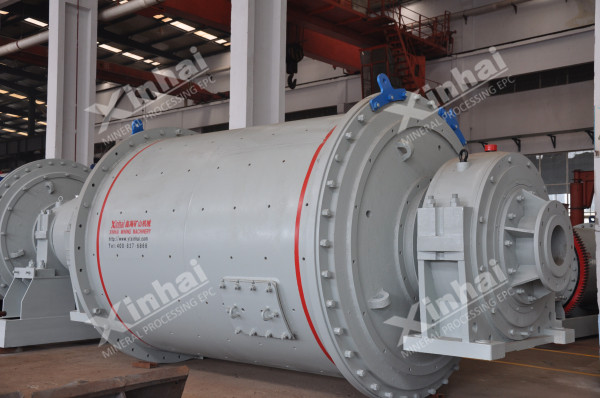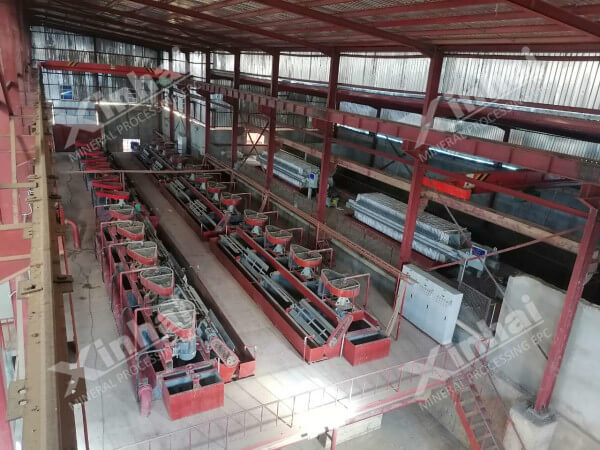Nickel ore stage grinding and flotation process refers to dividing the grinding and flotation process of nickel ore into multiple stages, and each stage performs grinding and flotation operations separately according to the characteristics of the ore and the requirements of mineral processing. This process can effectively improve the dissociation degree of the mineral, reduce over-grinding, and improve flotation efficiency and metal recovery rate.

(1) Rough grinding and rough selection
Grinding fineness: The grinding fineness of the rough grinding stage is generally controlled at -0.074mm, accounting for about 60%, to ensure that most minerals can be dissociated.
Floatation conditions: The flotation conditions of the rough selection stage include reagent system and flotation time. Commonly used collectors include xanthate, frothers include pine oil, and adjusters include lime. The flotation time is generally controlled at 3-5 minutes.
(2) Return and re-grinding of middlings
Processing of middlings: The middlings after rough selection are determined based on their characteristics whether to return to rough selection or re-grind. If the middlings contain a large number of undissociated minerals, they can be returned to rough selection; if the middlings are coarse, re-grinding is required.
Re-grinding fineness: The grinding fineness of the re-grinding stage is generally controlled at -0.074mm, accounting for more than 80%, to ensure that the minerals are fully dissociated.
Re-selection conditions: The flotation conditions of the re-selection stage are similar to those of the rough selection, but the reagent dosage and flotation time can be adjusted appropriately. The concentrate after reselection is combined with the rougher concentrate, and the middlings are returned for regrinding or roughing.
(3) Concentration
Number of concentrating: The concentrating stage is usually carried out 2-3 times, and the reagent system and flotation time of each concentrating are adjusted according to the grade and recovery rate of the concentrate.
Reagent adjustment: The amount of reagent used in the concentrating stage is relatively small, and the main purpose is to improve the grade of the concentrate. Commonly used reagents are xanthate and pine oil, and the flotation time is generally controlled at 2-3 minutes.
Concentrate quality control: Through multiple concentrating, the concentrate grade is gradually improved, and finally the concentrate grade and recovery rate required by the beneficiation process are achieved.

A nickel ore dressing plant adopted the stage grinding and flotation process and achieved remarkable economic benefits. The nickel ore of the plant is nickel sulfide ore, which contains a large amount of pyrite and pyrrhotite. Through the staged grinding and flotation process, the nickel recovery rate was increased from the original 60% to 75%, and the concentrate grade was increased from the original 8% to 12%.
Process flow:
Rough grinding and rough selection: After the nickel ore is crushed, it enters the ball mill for rough grinding, and the grinding fineness is controlled at -0.074mm, accounting for 60%. The ore pulp after coarse grinding enters the flotation machine for rough selection. The flotation conditions are: collector dosage 150g/t, frother dosage 30g/t, regulator dosage 1500g/t, and flotation time 4 minutes.
Return and re-grinding of middling ore: The middling ore after roughing is returned to roughing, and the re-grinding fineness is controlled at -0.074mm, accounting for 80%. The regrinded pulp enters the flotation machine for re-selection. The flotation conditions are: collector dosage 100g/t, frother dosage 20g/t, regulator dosage 1000g/t, and flotation time 4 minutes.
Concentration: The concentrate after re-selection enters the flotation machine for selection, and the number of selections is 3 times. The flotation conditions for each selection are: collector dosage 50g/t, frother dosage 10g/t, and flotation time 2 minutes. The final concentrate grade reached 12% and the nickel recovery rate reached 75%.
Nickel metal is widely used in modern industry, especially in recent years, with the promotion of new energy vehicles, the market of nickel metal has been driven. As the main mineral resource for extracting nickel, the situation of nickel ore is gradually rising. The stage grinding and flotation process can effectively improve the flotation effect, improve the concentrate grade and the recovery rate of ore dressing in nickel ore dressing, and provide a better solution for the rational use of nickel ore resources.